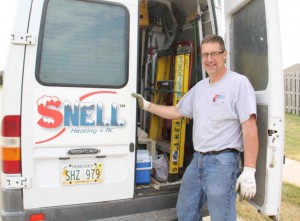Tips to Lower Energy Bill

Jerry Snell | Call 402-332-3531
Is your energy bill high? There is one way to lower your utility bill – seal leaks. Here at Snell Heating and AC in Gretna, which serves the Omaha metro, we offer a strategy on how to do air leakage testing, and a plan of action.
How to Find Air Leaks in Home
Snell Heating and Air recommends you schedule an appointment to come out for a home comfort system check up – of your AC and furnace.
“We also will have a conversation. We talk about how your home is working for you – comfort-wise, such as is it hot in one room, and other may be cold? Is one area of the house, more uncomfortable than another,” said Jerry Snell, owner of Snell.
Snell then thoroughly checks your system. If you’re having air flow problems, the Omaha heating and cooling contractor tries to figure out what can be done to get more air into the zones. It can be something as simple as a blower speed adjustment. It could be more in-depth, like having to seal the duct work due to leakage, noted Jerry.
Here’s a great analogy:
“We like to think of the air distribution line as a garden hose. If you have a garden house with holes spraying everywhere, with not much water coming out the end, then we seal the holes,” Snell added.
How to Detect Air Leakage Yourself
Besides scheduling an in-house service call, here’s what you can do. First, answer these questions. On a breezy day do you feel a draft? Do the curtains move? During the heating season, do you get ice on the inside of your windows? If it’s snowing, and the snow/ice blows inside the door or window, you may have a problem!
If you detect leakage, you can caulk and seal windows, doors and siding with products you can purchase at your local hardware store. Plus, Snell can point you toward local companies that can remedy the issues, too.
Again, you can try to address yourself many of the air leakage problems. Here are some tips from OPPD, the Omaha Public Power District.
WINTER ENERGY-SAVING TIPS
- Schedule a fall check-up of your heating equipment with a licensed contractor. Dirt and neglect are the main causes of system failures.
- Clean or change your system’s air filter monthly to save energy and help prevent system failure.
- Set your thermostat as low as comfortably possible.
- By resetting your programmable thermostat from 72 degrees to 65 for eight hours a day, you can cut your heating bill by up to 10 percent. (Resetting not recommended with heat pumps.)
- Close the damper when you’re not using your fireplace. This will greatly reduce heat loss up the chimney.
- Never use a traditional fireplace for supplemental heating. A fireplace sucks air out of your home to fuel the fire and exhausts warm air out through the chimney.
- Leave shades and blinds open on sunny days, but close them at night to reduce the amount of heat lost through windows.
- Seal cracks and other openings in your home to minimize air leaks.
- Replace or add weather-stripping around door frames and window frames.
- You also may need to caulk between the frame and the siding on the inside and outside.
- Check the insulation in your attic, ceilings, exterior and basement walls, floors and crawlspaces to make sure it meets ENERGY STAR-recommended levels.
- Learn about OPPD’s Home Energy Analysis.
- Get more tips from the Department of Energy.
SUMMER ENERGY-SAVING TIPS
- Schedule spring check-up of your cooling equipment with a licensed contractor. Dirt and neglect are the main causes of system failures.
- Clean or change your system’s air filter monthly to save energy and help prevent system failure.
- Set your thermostat as high as comfortably possible. A one-degree increase can save 3 to 5 percent on energy.
- Keep your house warmer than normal when you are away. Consider installing a programmable thermostat for this.
- Use ceiling fans to enable you to raise your thermostat about 4 degrees, with no reduction in comfort.
- Turn off ceiling fans when you leave the room. Fans cool people, not rooms, by creating a wind chill effect.
- Keep window shades and blinds closed to block direct sunlight.
- Seal cracks and other openings in your home to minimize air leaks.
- Learn about OPPD’s Home Energy Analysis.
- Check the insulation in your attic, ceilings, exterior and basement walls, floors and crawlspaces to make sure it meets ENERGY STAR-recommended levels.
- Get more tips from the Department of Energy.
When in doubt, call Snell, your Omaha area heating and air conditioning company for more information on how to save on your energy bills, and make certain your home comfort system is running right.









Leave a Reply